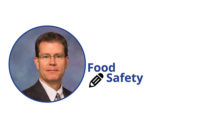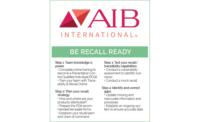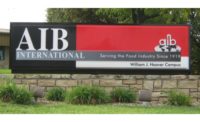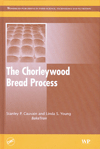Bakery kill-step validation to comply with FSMA

Lakshmikantha Channaiah
Although most bakery food products are protected from microbes, due to its intrinsic and extrinsic properties, microbial spoilage often is the major factor limiting the shelf life of bakery products leading to huge economic losses. Though not directly linked to production practices, there were several illnesses associated with bakery products reported in the U.S. between 1998 and 2007. Food-borne pathogens can be introduced into bakery products through a wide range of ingredients, pests and unhygienic handling. Among food-borne pathogens, Salmonella has long been a leading microbiological hazard around the globe due to its remarkable ability to survive under different adverse environmental conditions.
Although most bakery products undergo a putative kill step at the point of production, such as baking, cooking, roasting, etc., these lack scientific proof or validation. The Food Safety Modernization ACT (FSMA), which was signed into law by President Obama on Jan. 4, 2011, shifts the focus from responding to food-safety failures to preventing it.
The FSMA final rules (117.160) clearly state that the “validation of preventive controls includes obtaining and evaluating scientific and technical evidence or, when such evidence is not available or is inadequate, conducting scientific validating studies to determine whether the preventive controls, when properly implemented, will effectively control the hazards that are reasonably likely to occur.”
Mandatory proof
Per FSMA, each registered food manufacturing facility in the U.S. is required to implement this mandatory rule demonstrating scientific documented evidence of preventive controls ensuring control of possible harmful pathogens, such as Salmonella spp., E. coli O21, Listeria monocytogenes, etc., that may have come with the raw ingredients, pests and due to other environmental factors.
In order to help the baking industry’s food safety needs and to comply with the FSMA validation requirement, AIB International has collaborated with the American Bakers Association Food Technical and Regulatory Affairs Committee, Kansas State University, and University of Georgia to develop validation procedures for bakery products.
Since 2013, AIB International has conducted a series of scientific validation studies involving hamburger buns, 100 percent whole-wheat multigrain pan bread, basic round-top cake muffins, crisp cookies, soft cookies, nut muffins, and doughnuts.
| Enlarged Image |
Helping bakers around the world
AIB International published its first kill-step validation research involving hamburger bun in the Journal of Food Protection (“Validation of Baking to Control Salmonella serovars in Hamburger Bun Manufacturing, and Evaluation of Enterococcus faecium ATCC 8459 and Saccharomyces cerevisiae as Nonpathogenic Surrogate Indicators,” April 2016). Additionally, AIB International has developed a series of “Baking Process Kill-Step Calculators” for various bakery products.
The main objective is to provide bakers around the world a scientific tool to evaluate lethality of their baking process for the destruction of Salmonella spp. in a variety of bakery products. These kill-step calculators can be downloaded from AIB International’s website and come with detailed instructions and procedures. In short, the baking process kill-step calculator utilizes the product’s internal temperature and baking time data to determine the total process lethality for Salmonella in log values. The D, Z and T-ref (i.e., reference temperature) is already built into the calculators. Bakers just need to enter at least 20 “time X temperature” data points to the calculator, which automatically calculates the total log reductions for Salmonella. Upon entering 20 data points to the calculator, it automatically calculates the total process lethality for Salmonella in log values and generates three graphs:
- Product internal temperature
- F value/minimum
- Cumulative log reduction
If the desired log reduction is achieved, then the process lethality report generated can be used as guidance and as a supporting document for FSMA validation and verification purposes. Generally, a kill-step validation study using a pathogen or surrogate microorganism could cost an estimate of $40,000 to $50,000 per product with a minimum of four to six months of time. Using AIB International’s baking process kill-step calculators, bakers can validate a baking process in about four hours.
AIB International strongly believes that these baking process kill-step calculators will enable bakeries of all sizes to meet the requirements of FSMA without investing in costly and time-consuming microbial challenge studies. At the time of publishing, over 2,800 downloads of various calculators have helped those in the industry.
Lakshmikantha Channaiah is Director of Microbiology at AIB International. For more information, visit www.aibonline.org.
Looking for a reprint of this article?
From high-res PDFs to custom plaques, order your copy today!






